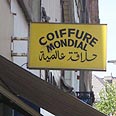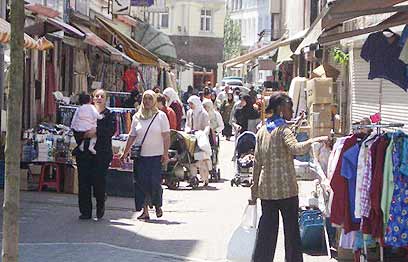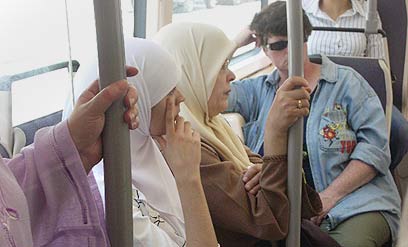
Middle East in heart of Brussels
Ynet reporter roams streets of Muslim quarter in Belgium city. EU representative: There are positive sides to flow of immigrants. Moroccan immigrant says 'It is a shame that al-Quds is occupied and we cannot reach it, and pray in it. Maybe one day we will have the opportunity to come and visit you'
The invitation was heartwarming: "You are invited to Friday's prayers. Some 4,000-5,000 worshipers will be in Brussels' main mosque, including myself. I will wait for you."
The inviter: None else than a Moroccan waiter, Hassan, who works in central Brussels. Monuments scattered across the city bear witness to the rich Christian history of the European capital and made it all the more interesting to attend Friday's prayers.

Muslim quarter (Photo: Roee Nahmias)
The way to the Muslim quarter is a few underground stops away from the buildings housing the European Union headquarters.
The intention was to attend Friday's prayers at the Al-Khalil Mosque, chat with worshipers and learn about the large Muslim population in the city.
Nothing could prepare he who is not familiar with Brussels' secrets to what takes place above the ground.
The minute I rose above ground, the feeling of the rich and splendid Christian culture disappears and a quarter of Muslim immigrants appeared.
For a moment it was difficult to distinguish head-covered women and Christian men.
Many shop signs announce market their merchandise in Arabic and unwelcoming looks meet a stream of tourists who popped up from nowhere.

'Head-scarf more common in Belgium.' (Photo: Roee Nahmias)
A merchant who's on the lookout for those seeking to photograph the Arabic sign of his ship signals unequivocally that its best for us to leave immediately, and certainly to not take pictures.
Others looked with gleaming eyes.
"It is scary here, don't be crazy!" they said. Inquires for directions to the mosque were unanswered and we were forced to leave.
EU representatives who live close to the quarter are aware of the problem's consequences, but they don't have a solution.
"Despite it all, the number of foreign workers will only rise over the next 20-30 years," an EU representative told Ynet.
"Europeans have a psychological problem. They refuse to do black jobs like cleaning, and see themselves as too good to do this kind of work. Some, because of good welfare systems, prefer to stay unemployed and not to work in these fields, which allow the influx of immigrants."
What are the implications of the situation?
"The situation has many circumstances. A small example: Spain witnessed a large number of Muslim immigrants over the last decade and in a small town in Catalonia Muslims made up a third of inhabitants. Two years ago the community asked for permission to build a Mosque. The local council refused to grant permission and in return a local cultural center was turned into a mosque. When the community knew, a big storm took place. But there are positive sides to the flow of immigrants. For example, a community of Moroccan immigrants working in the energy field in Belgium, formed a union and invested in electricity projects in Moroccan villages, with encouragement from the European Union."
Hassan, the Moroccan waiter, is an example of the influx of immigrants. He immigrated to Belgium with his father years ago when he was 30. The father returned home, and Hassan visits him every summer.
For the rest of the year, it is reasonable to assume that he doesn't feel great loneliness: There is a considerable number of Moroccan waiters in the street where Hassan works, and in a shop nearby we chatted with other Moroccan about the quality of Israeli fruit produce exported to Europe.
"These are good fruit because they are from the Holy Land. It is a shame that al-Quds (Jerusalem) is occupied and we cannot reach it, and pray in it. Maybe one day we will have the opportunity to come and visit you," a Moroccan said.
The head-scarf which caused a public debate in France, is more common in Belgium. Hijab-clad women could be seen on almost every street but the situations are different: Some hug their teenage friends wearing tight clothes, other walk conservatively and meticulously, and there were even some who begged for money with their children in fast-food restaurants.










